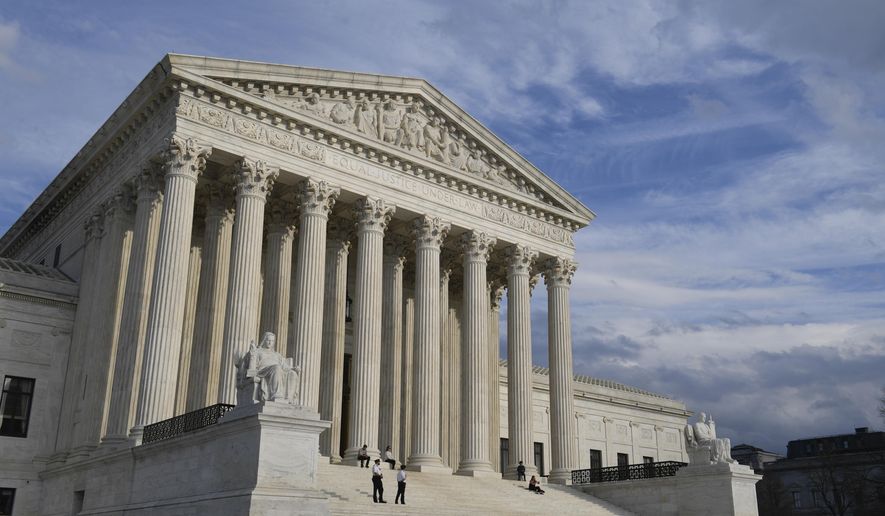Justice Stephen G. Breyer fretted Monday that the Supreme Court may have gone too far when it allowed disparaging words to be used in trademarks — wondering whether the government must now allow a notorious racial slur to earn protection.
None of the justices would say the slur from the bench during oral arguments, but it was clear what they had in mind. Justice Breyer called it “the racial slur we all know about.”
The issue arose as the Supreme Court considered a case involving Los Angeles fashion designer Erik Brunetti’s brand Fuct.
He argues he is entitled to a trademark despite the government’s contention that the word is “immoral” and “scandalous” and runs afoul of the Lanham Act governing trademarks.
The problem for the Patent and Trademark Office (PTO) — and for the high court — is an 8-0 ruling in 2017 that said the agency could not refuse a trademark for a band that calls itself the Slants. And by extension, the PTO could not refuse trademarks for the NFL’s the Washington Redskins.
That sent the justices off looking for ways to draw lines, without putting the government in the business of dictating viewpoints.
“What I am worried about is the viewpoint, as you say, but I’m also worried about the — the racial slur we all know about, OK, suddenly, in certain places in the United States,” Justice Breyer said, “appearing as a product name, appearing on every bus where it’s advertised.”
The government’s lawyer said the 2017 decision on the Slants struck down a prohibition on disparaging trademarks but said the court could still keep in place the Lanham Act’s prohibition on scandalous trademarks.
“The government has an independent interest in protecting unwilling viewers to the extent possible,” said Malcolm Stewart, the attorney for the Justice Department.
But John Sommer, who represented Mr. Brunetti, said the government is still engaging in viewpoint discrimination by deciding who would be offended by various words.
“A substantial number of Americans think that gambling, drinking, eating some types of meat, eating meat at all is immoral,” he said. “A substantial number of Americans, as to abortion, gun control, immigration, our two political parties, a substantial number think that those are … immoral.”
Mr. Brunetti’s request left the court tongue-tied. None of the justices, nor even any of the lawyers, would even sound out his trademark during Monday’s arguments.
Justice Samuel A. Alito Jr. called it “the word your client wants to use.” Justice Breyer talked about “the word involved in your case.”
Mr. Sommer, who had previously alerted the court he wouldn’t say the word either, pointed out that other trademarks that would appear to be in the same family have been approved: FCUK, a fashion brand, and FVCK, used in a number of trademark requests.
That struck a nerve with Justice Brett M. Kavanaugh. “How do you deal with the problem of erratic or inconsistent enforcement?” he asked the government.
Justice Neil M. Gorsuch echoed Justice Kavanaugh’s concerns, questioning where there could be a “rational line.”
“Is it a flip of the coin?” he wondered.
Yet other court members were thinking of the children who might see T-shirts emblazoned with the word while walking a shopping mall.
“For parents who are trying to teach their children not to use those kinds of words, they’re going to look at that and say, ’well, look at that,’” Chief Justice John G. Roberts Jr. said. “Then, you know, they’re going to see the little trademark thing and say, well, it’s registered trademark. Well, they won’t say that, but you understand my point.”
Justice Breyer, concerned about opening the door to a notorious racial slur, said there may be another line to be drawn around incitement.
“I think that very often the word involved in your case and the racial slur is not viewpoint. It is used to insult somebody, rather like fighting words,” he said.
Mr. Sommer said his client was intentionally trying to be edgy and antiauthoritarian.
Simon Tam, the man who won his fight to trademark his band name the Slants two years ago, backed Mr. Brunetti in his battle.
“The ban on registering ’immoral’ or ’scandalous’ trademarks is a relic of the Victorian era, when judges and other government officials were often enlisted to scrub public discourse of anything that might offend the most prudish sensibilities,” he argued in court papers.
• Alex Swoyer can be reached at aswoyer@washingtontimes.com.




Please read our comment policy before commenting.